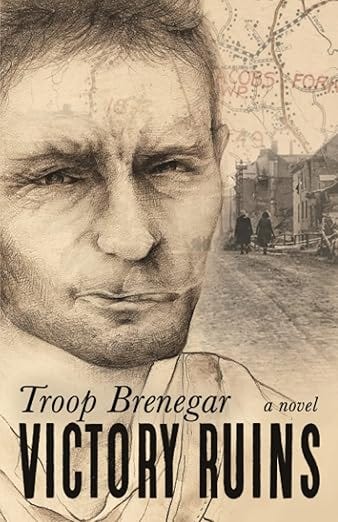Reviewing fiction is a unique challenge because there is a metaphysical quality to all narrative insomuch as it transcends material reality. When judging whether or not a piece of fiction is good or bad, you can’t merely reduce it to the quality of its prose, the coherence of its plot, or the satisfaction of its conclusion. That may be enough for an editor of a literary magazine or publishing house gatekeeper, but truly great fiction requires deeper consideration. The realm of the philosopher and not the scribe as it were. I say all of this to make the point that Victory Ruins possesses the metaphysical quality of a truly great work of literature, and I hope that I will do the work justice in this review.
Plot
Victory Ruins follows the stolid and dutiful Arlen Breckenridge as he struggles between the duty owed to his family and the duty owed to his country at the outbreak of World War II, and continues to tell the story of these diametric loyalties as he marches across Europe and ultimately ends up at the place he started, even though that place is very different than he remembers it.
Theme & Genre
The book is a genuine piece of Southern Literature. Dealing with the immense pressures of place, identity, and tradition as they could only materialize in the rural South. These themes were presented in a way that only someone who grew up haunted by these same ghosts could do. Like Arlen, I can’t explain in words what ties me to the way and place of my fathers, but if you know anything about that way of being, no explanation is required. Yet, unfolded in the pages is the inner turmoil over such things that I, and so many others who grew up in the rural South are intimately familiar with. It was a beautiful thing to see that sentiment put into words, yet it still lacked a definition, because words alone can’t define such a thing, only feeling, duty, and tradition can.
This book is Agrarian Literature, but it is also equally Historical Military Fiction. Both elements are done equally well, and I was certain that the author was a veteran himself after reading how well he presented the interior life of a combat veteran. To my surprise, when I asked him, he told me that he had never been in military service. This alone was very impressive to me, for it shows that Mr. Brenegar has an intuitive understanding of human nature, grace under pressure, and what extreme duress can do to the human psyche.
Style
Victory Ruins reads like a classic piece of Southern Literature, and I would not have been surprised at all if someone had told me the book was written in the late 1940s. That is not to say that the writing is antiquated, but that I was completely immersed in a world that was presented so well that I swore the author had intimate knowledge of it. That is no small feat. In other words, this wasn’t a tale to be told, but a life lived and written out.
His prose is clean and not a single word was out of place. Frankly, the quality of the writing is better than just about every piece of mainstream fiction I’ve read in a very long time. If I were the head of one of the major publishing houses and the Victory Ruins manuscript made it to my desk, it would be published and distributed immediately.
The book is coherent with a strong plot, and there is a continuity in the interior life of Arlen that keeps our feet firmly planted on the ground when chaos seems to be everywhere else. These interior thoughts and struggles were an integral part of the style, as they often laid bare the truth that Arlen so desperately attempted to conceal in his exterior conduct and language.
Also, all of the characters were living people. Not just well-developed or well-written. I came away with the distinct feeling that each and every one of the characters was alive, or at least had lived once, and were dancing in Arlen's memories.
Final Thoughts
If the review has seemed brief up until this point, you would be correct. All of the usual categories of appraisal are strictly material, and unlike previous reviews in the magazine, there is nothing experimental about the writing that requires an explanation for the uninitiated.
This is where I want to interject with my own opinions and be completely and totally subjective.
Without exaggeration, Victory Ruins is the best book I’ve ever read, and at this point, it is my favorite piece of literary fiction. So much of what Arlen has felt, I have felt. So much of what Arlen has feared, I have feared. So much of what Arlen has struggled with, I have struggled with.
I laughed with Arlen, I cheered for him, I celebrated with him, and I wept with him. You know a character is good when you look back on the time spent with them, not as a time reading a story about an abstract personality, but the accumulation of memories in years of relationship with a dear friend, remembering their story as if you really had a part in it.
If you would like to buy this wonderful novel, you can buy it here.
If you are interested in the author, you can find his X account here, and his Substack here:
SPOILERS BELOW
For those who don’t know me very well, I grew up on the remains of a farm, no longer active during my childhood. My grandfather bred horses, and my father was into cattle in his youth, trading it for crop in his maturity. In the span of three generations, the family farm was divided and shrank from about 70 acres to just 12. Most of that was done in my grandfather’s time. I don’t blame him, money was tight, and what’s a few acres here and there, right? Either way, like many old men, he didn’t have to deal with the results of those decisions. He sold land and he got money to live. I am certain he wasn’t thinking that his grandchildren wouldn’t see a penny of it or the land he sold to get it.
We still farm, just on ground that isn’t ours now. The old homeplace is still in the family, but I wonder if it will remain in the family by the time my childless aunt and uncle who live there pass.
Although this story isn’t totally sad, we have very recently relocated to 40 good acres not far from our original homeplace after a few years of sojourning in the nearby town. That is to say, I understand what Arlen is afraid of because it happened to us. Nobody who has an inextricable tie to the land wants to be parted from it. Going forward I aim to make a new legacy on this new ground for generations to come.
When Arlen is forced to mortgage the family farm or lose it at the end of the book, he does so to protect it in its entirety. A better prospect than selling it off one section at a time. I really admire him for that, and the author for writing him that way.
This is what I meant by a metaphysical quality and living characters. Arlen and I are the same, if not in reality, then in the way we are.
Maybe it’s my favorite book because it was written for me…
Thank you for reading this review. Now go get a copy of Victory Ruins!





Thank you, sir, for making a father proud for his son. When the book came out, I recorded at interview with him. I think you’ll enjoy our conversation. https://edbrenegar.substack.com/p/victory-ruins
I am tickled pink that it meant so much to you. It was certainly a labor of love; as such, I came to regard the characters with affection. I miss seeing them every day, so it does me well to know you feel for them as I do, and it helps bring their memory back to me a bit. Thank you again for your generous and gracious review.